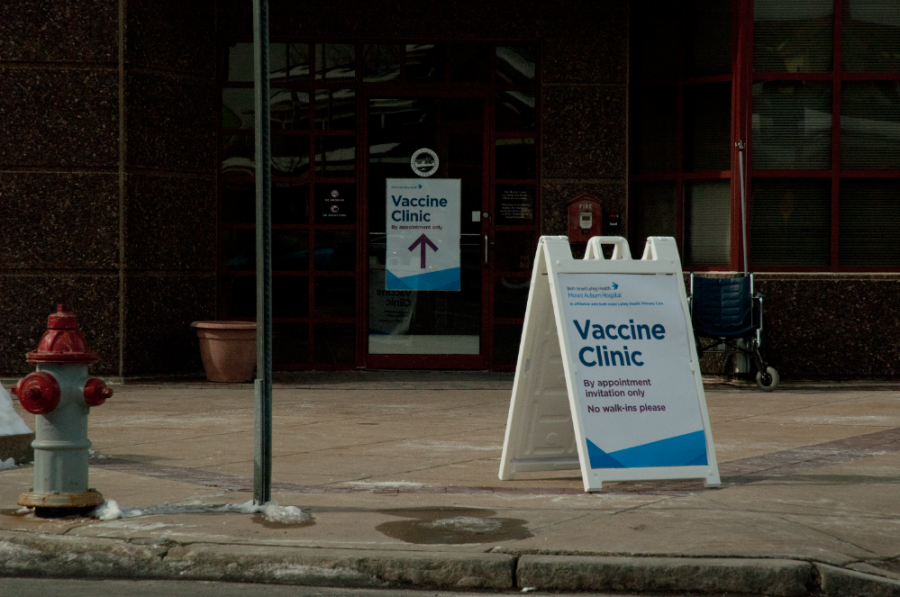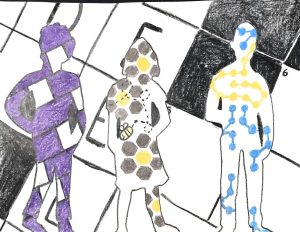Massachusetts Vaccine Rollout Faces Challenges
Signs for a vaccination clinic outside of Mount Auburn Hospital in Cambridge, Massachusetts.
February 26, 2021
As Massachusetts enters the second phase of its COVID-19 vaccination plan this month, citizens are frustrated with the slow rollout. In addition to the residents of long-term care facilities, first responders, and healthcare workers covered in Phase 1, the second phase is providing vaccinations for those 75 and older, 65 and older, and a variety of workers, including early education, grocery, utility, and restaurant employees.
As of February 8th, 1,283,700 doses of the COVID-19 vaccine have been shipped to Massachusetts, according to the state health department. Health officials say 214,361 people have been fully vaccinated while 696,051 people have received one dose of either the Moderna or Pfizer vaccine. According to the Department of Public Health (DPH), 1,096 doses of the Moderna vaccine and 176 doses of the Pfizer vaccine have been reported as wasted thus far in the scrutinized rollout process, accounting for over 1,200 doses altogether. Massachusetts is currently ranked only 27th nationally for the percentage of vaccines administered.
The administration’s current signup website could be a possible explanation; it directs users to third-party providers’ websites in order to book appointments, a difficult multi-step process for many seniors. “The system is cumbersome, contradictory, and asks residents over 75 to navigate a haze of web links, locations, and instructions, each with different criteria and scheduling systems,” State Senator Eric Lesser told Boston.com. “And for those with limited ability to navigate the internet, there is no access to appointment booking at all.”
Many policymakers have called for a more streamlined system. While other states have set up more centralized websites where users can browse open appointments across various vaccination sites and times that work for them, Governor Charlie Baker admitted that his administration has struggled with this approach. It has apparently proved difficult to merge this website with the different websites of various third-party providers where residents can get the vaccine: “A lot of the retail organizations have their own setup, and they’re organized to serve quote-unquote their customers, which makes it a little complicated for us to make it as smooth a transaction as we would like it to be,” Baker said in an interview with reporters following a tour of the new mass vaccination site at Fenway Park in Boston.
It’s also becoming hard to ignore the growing evidence of a racial gap in vaccinations. CDC and state data shows that people of color die of the disease at a higher rate than their white counterparts, and the most recent state report shows that white residents of Massachusetts have received nearly 36 percent of the vaccines distributed to date, while only 2.6 percent of doses have been given to Black residents—the lowest percentage of all races vaccinated with 3.3 percent for Hispanic residents, 2.8 percent for Asian residents, and about 20 percent to those who identify as multi-racial, though it should be noted that thirty-five percent of survey respondents did not specify their race, or checked “other.”
In order to address this issue, Senator Becca Rausch filed a bill earlier this month along with over 20 other state lawmakers that would create a mobile vaccination program. This would consist of at least 30 buses or vans across Massachusetts seeking to reach communities with the highest rates of COVID-19 test positivity. Regardless of phase designations in the state’s distribution plan, residents of those communities would also be eligible to get a vaccine. “Even those who are eligible for a COVID vaccine cannot get an appointment unless they have internet and car access, ample time to spare, literacy in specific languages, and technological proficiency,” Rausch told Boston.com. “This bill significantly strengthens immunization implementation and infrastructure statewide by advancing racial, economic, and regional equity in vaccination access and outreach.”
“I think the vaccination process in Massachusetts is probably not moving as quickly as it should be based on our amount of healthcare access and resources,” CRLS sophomore Margaret Rowe told the Register Forum. In response to backlash over the rollout plan, Massachusetts Governor Baker’s administration launched a vaccination hotline and has also made some tweaks to the state’s appointment website in the last few weeks, including a tool that allows users to utilize their zip code to find a nearby immunization site. How the rollout plan will continue to (hopefully) improve remains to be seen as the general public awaits access to vaccines sometime in April.









